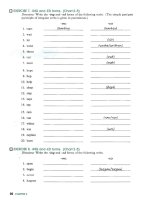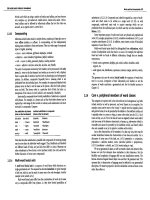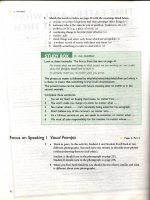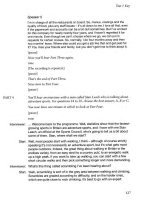Wrong in english 7 pps
Bạn đang xem bản rút gọn của tài liệu. Xem và tải ngay bản đầy đủ của tài liệu tại đây (176.42 KB, 6 trang )
DIRECT
SPEECH
considered acceptable
forms.
My
tastes
are
DIFFERENT
FROM
yours.
My
tastes
are
DIFFERENT
TO
yours.
Conservative
users would, however, much prefer
the
preposition
'from'
and
this
is
widely used
in
formal
contexts.
'Different
than'
is
acceptable
in
American
English
but is not yet
fully
acceptable
in
British English.
difficult
(not
differcult,
not
difficalt)
dilapidated
(not
delapidated)
dilemma
This
word
is
often
used loosely
to
mean
'a
problem'.
Strictly
speaking
it
means
a
difficult
choice
between
two
possibilities.
dinghy
or
dingy?
A
DINGHY
is a
boat (plural
-
dinghies).
See
PLURALS
(iii).
DINGY
means dull
and
drab.
dingo
(singular) dingoes
or
dingos (plural)
dining
or
dinning?
dine
+ ing =
dining
(as in
dining room)
din + ing =
dinning (noise dinning
in
ears)
See
ADDING ENDINGS
(i) and
(ii).
diphtheria
(not
diptheria
as it is
often mispronounced)
diphthong
(not
dipthong
as it is
often mispronounced)
direct
speech
See
INVERTED
COMMAS.
69
DISAGREEABLE
disagreeable
dis +
agree
+
able
disappear
dis +
appear
disappearance
(not
-ence)
disappoint
dis +
appoint
disapprove
dis +
approve
disassociate
or
dissociate?
Both
are
correct,
but the
second
is
more widely used
and
approved.
disaster
disastrous
(not
disasterous,
as it is
often
mispronounced)
disc
or
disk?
Use
'disc'
except when referring
to
computer disks.
disciple
(not
disiple)
discipline
discover
or
invent?
You
DISCOVER
something that
has
been there
all
the
time unknown
to you
(e.g.
a
star).
You
INVENT
something
if you
create
it for the first
time
(e.g.
a
time machine).
discreet
or
discrete?
You
are
DISCREET
if you can
keep secrets
and
behave
diplomatically.
Subject
areas
are
DISCRETE
if
they
are
quite
separate
and
unrelated.
70
DISINTERESTED
OR
UNINTERESTED?
discrepancy
(singular) discrepancies (plural)
discribe
Wrong
spelling.
See
DESCRIBE.
discribtion
Wrong
spelling.
See
DESCRIPTION.
discription
Wrong
spelling.
See
DESCRIPTION.
discuss
discussed,
discussing
discussion
disease
diseased
See
DECEASED
OR
DISEASED?.
dishevelled
disintegrate
(not
disintergrate)
disinterested
or
uninterested?
Careful
users would wish
to
preserve
a
distinction
in
meaning between these
two
words.
Use the
word
DISINTERESTED
to
mean
'impartial,
unselfish,
acting
for the
good
of
others
and not for
yourself.
My
motives
are
entirely
DISINTERESTED;
it is
justice
I am
seeking.
Use
UNINTERESTED
to
mean
'bored'.
His
teachers
say he is
reluctant
to
participate
and is
clearly
UNINTERESTED
in any
activities
the
school
has to
offer.
Originally,
DISINTERESTED
was
used
in
this sense
(=
having
no
interest
in,
apathetic),
and it is
interesting
that this meaning
is
being
revived
in
popular speech.
71
t
DISIPLE
Avoid
this
use in
formal
contexts, however,
for it is
widely perceived
as
being incorrect.
disiple
Wrong
spelling.
See
DISCIPLE.
disk
See
DISC
OR
DISK?.
displace
or
misplace?
To
displace
is to
move someone
or
something
from
its
usual place:
a
DISPLACED
hip;
a
DISPLACED
person
To
misplace something
is to put it in the
wrong
place (and possibly
forget
where
it
is):
a
MISPLACED
apostrophe;
MISPLACED
kindness
dissappear
Wrong
spelling.
See
DISAPPEAR.
dissappoint
Wrong
spelling.
See
DISAPPOINT.
dissapprove
Wrong spelling.
See
DISAPPROVE.
dissatisfied
(dis
+
satisfied)
dissociate
See
DISASSOCIATE
OR
DISSOCIATE?.
distroy
Wrong
spelling.
See
DESTROY.
divers
or
diverse
The
first is
rarely used nowadays except jokingly
or
in
mistake
for the
second.
DIVERS
means
'several',
'of
varying types':
DIVERS
reference
books.
DIVERSE
means
'very
different':
DIVERSE
opinions,
72
DOUBLE
NEGATIVES
DIVERSE
interests.
does
or
dose?
DOES
he
take
sugar?
He
DOES,
(pronounced 'duz')
Take
a
DOSE
of
cough mixture every three hours.
doesn't
(not
does'nt)
See
CONTRACTIONS.
domino
(singular) dominoes (plural)
See
PLURALS
(iv).
don't
(not
do'nt)
See
CONTRACTIONS.
dose
See
DOES
OR
DOSE?.
double meaning
See
AMBIGUITY.
double negatives
The
effect
of two
negatives
is to
cancel each other
out. This
is
sometimes done deliberately
and can be
effective:
I
am not
ungenerous.
(=1
am
very generous.)
He
is not
unintelligent.
(= He is
quite intelligent.)
Frequently,
however,
it is not
intentional
and the
writer ends
up
saying
the
opposite
of
what
is
meant:
I
haven't
had no
tea.
(=1
have
had
tea.)
You
don't
know nothing.
(=
You
know something.)
Be
particularly
careful
with
'barely',
'scarcely',
'hardly'.
These have
a
negative
force.
I
wasn't
SCARCELY
awake when
you
rang.
(=1
was
very awake.)
Be
careful
too
with constructions like this:
73
DOUBLING
RULE
I
wouldn't
be
surprised
if he
didn't
come.
Say
either:
I
wouldn't
be
surprised
if he
came,
or: I
would
be
surprised
if he
didn't come.
Sometimes
writers
put so
many negatives
in a
sentence that
the
meaning becomes
too
complicated
to
unravel:
Mr
Brown denied vehemently that
it was
unlikely
that
no one
would come
to the
concert.
Does
Mr
Brown think that
the
concert will
be
popular
or
not?
Rewrite
as
either:
Mr
Brown
was
certain
the
concert would
be
well
attended.
Or:
Mr
Brown
feared
that
no one
would come
to the
concert.
doubling
rule
See
ADDING
ENDINGS
(i) and
(iv).
doubt
(not
dout)
The
word
is
derived
from
the
Latin
word
dubitare,
to
doubt.
It may
help
you to
remember that
the
silent
b is
there.
Down's
syndrome
(not
Downe's)
downstairs
(one word)
draft
or
draught?
A
DRAFT
is a first or
subsequent attempt
at a
piece
of
written work before
it is finished.
A
DRAUGHT
is a
current
of
cool
air in a
room.
74









